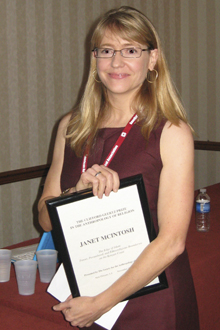McIntosh wins Clifford Geertz Prize
Anthropologist honored for book on Islam in Kenya

Janet McIntosh
Associate Professor of Anthropology Janet McIntosh is the recipient of the 2010 Clifford Geertz Prize in the Anthropology of Religion, given to “an outstanding recent work in the field,” for her book “The Edge of Islam: Power, Personhood, and Ethnoreligious Boundaries on the Kenya Coast,” published in 2009 by Duke University Press.
In this exploration of ethnic and religious tensions, McIntosh demonstrates how the relationship between two ethnic groups in the bustling Kenyan town of Malindi is reflected in and shaped by the different ways the two groups relate to Islam. “The Edge of Islam” explores themes as wide-ranging as spirit possession, divination, healing rituals, madness, symbolic pollution, ideologies of money, linguistic code-switching, and syncretism and its alternatives, while it demonstrates how the differing versions of Islam practiced by Swahili and Giriama, and their differing understandings of personhood, have figured in the growing divisions between the two groups.
David Parkin, Professor Emeritus of Anthropology at the University of Oxford, has hailed the book as “An impeccable study” and “a work of the highest order, a meticulous analysis, and a mine of insights and information that will serve generations to come.” Historian Cynthia Brantley writes in African Studies Review: “It is extremely hard to do justice to this remarkable book, which is filled with excellent analysis and narratives,” while Michelle Moyd describes it in Africa Today as “methodologically innovative, provocative, and timely.”
In a report to Anthropology News, one member of the Geertz Prize jury remarks: “McIntosh’s was the most subtle and engaging study of the entanglements of categories of ethnic and religious identifications that I've read.” Another jury member continues: “Clifford Geertz [would have] approved of this choice for many reasons, but perhaps most of all because it is written in such elegant but straightforward prose. It is indeed a welcome and important contribution to the Anthropology of Religion in general and to the Anthropology of Islam and to Possession studies more particularly.”
Categories: Humanities and Social Sciences, International Affairs, Research






